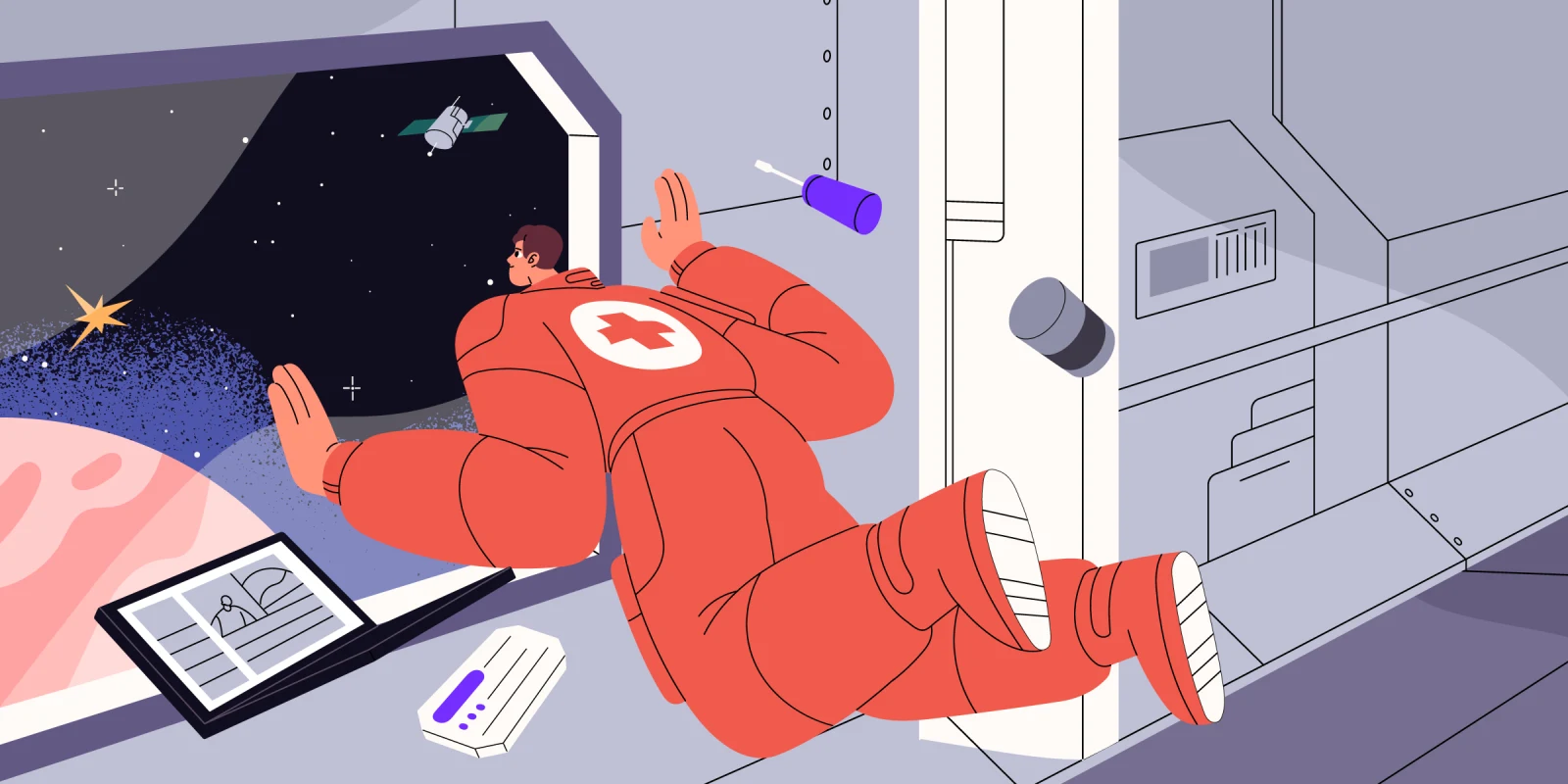In this age of war, climate devastation, global pandemics, and endless tasks flooding our EMR inboxes, it is only natural to look up to the twinkling night sky. We scan the cosmos for inspiration and greater meaning. NASA and SpaceX are planning voyages to Mars followed by colonization of the planet. Sometimes it may seem easier to start anew than to fix all our problems here. But traveling the roughly 140 million miles between Earth and Mars, through a punishing vacuum of cosmic radiation, with temperatures hovering around 3 Kelvin, is no easy task. It will take brilliant engineers, technological advances, and an incredibly brave crew. And most importantly, that crew will need a family physician.
In his book entitled “The Future of Humanity,” theoretical physicist and bestselling author Dr. Michio Kaku writes about the potential crew members for a mission to Mars: “After rigorous training [as astronauts], perhaps four candidates will be carefully chosen for their skills and experience, probably including a seasoned pilot, an engineer, a scientist, and a doctor.”
This is hardly controversial. There have been at least 44 physician astronauts. Their backgrounds, training, and accomplishments are staggering. They are stellar human beings.
The ideal physician for a trip to Mars must be like a multifaceted pocket knife. A jack of all trades whom you would want in your band of survivors during a zombie apocalypse.
In family medicine residency training, we learn the vital foundations of each specialty through first-hand experience. From rotations in surgery, we learn that all bleeding eventually stops. From emergency medicine, if your patient is sweating, then you should be too. From dermatology, if it’s wet dry it, if it’s dry wet it. From psychiatry, everything is underpinned by the biopsychosocial model. From geriatrics, try to avoid benzodiazepines and anticholinergics. From internal medicine, well, just memorize the entire Harrison’s.
We are basically ready for the interplanetary practice of medicine.
The dangers of space travel, however, are formidable and numerous. Blistering space radiation, altered gravity fields, extreme isolation and confinement, claustrophobic and closed environments, and a staggering distance from Earth all combine to make our home planet supremely comfortable by comparison. Space travel has been linked with well over 30 human health risks, as documented by NASA’s Human Research Program. A family physician on a trip to Mars will have to contend with space radiation health risks including cancer, cardiovascular disease, and behavioral health and cognitive performance decrements. Not to mention Spaceflight-Associated Neuro-ocular Syndrome, in which visual impairment, scotomas, and headaches occur.
And yet, I believe family physicians are specially qualified to sign up for such a daunting mission. We are well-versed in going against the grain. Throughout medical school, we are told that family medicine is a fading specialty and hazardous career choice. Lower pay, less prestige, long working hours, competition from mid-level clinicians, a breadth of knowledge that is difficult to master and keep up with. Yet still we dive in, following a sense of calling like a siren song from Martians.
The American Academy of Family Physicians rightly points out that “unlike other specialties that are limited to a particular organ or disease, family physicians are the only specialists qualified to treat most ailments and provide comprehensive health care for people of all ages — from newborns to seniors.”
In terms of caring for Earthlings (and Martians?), our skill set would allow us to:
- Care for patients regardless of age or health condition, sustaining an enduring and trusting relationship. This is key, as a round trip would take about two years. This opportunity for intense care and constant contact exceeds most elite concierge practices.
- Understand community-level factors and social determinants of health. Depending on the size of the crew, a makeshift community will blossom. Confined space flight will flatten the usual determinants like where people live, learn, and work. Packed together in a rocketing tin can, a sort of utopia may develop, fostered and nurtured by a family physician’s sensitive care.
- Serve as a patient's first contact for health concerns. Depending on the position of the spacecraft during travel, or orbital distance between Mars and Earth once landed, it would take up to 20 minutes for a radio signal to reach physicians at home. To reach a specialist, expect a minimum of three months. Family physician on board? Instant access. Blistering space radiation? Here’s a cocktail of antioxidants and freeze dried blueberries. Troubling cardiovascular and emotional issues developing? Here’s rosuvastatin, an SSRI, and a dash of CBT. Just like our practice back on Earth, these prescriptions are oversimplified shorthands for remedying larger underlying problems, but we do our best with patches and prescription pads.
- Navigate the health care system with patients, including specialist and hospital care coordination and follow-up. I would expect appointments in space to be much like terrestrial ones. Family docs by necessity are experts in dealing with scattered records across multiple health systems, and in this case planets. We can translate the advice and expertise of our specialist colleagues in ways that live up to the teaching roots of the word doctor.
- Use data and technology to coordinate services and enhance care. If we can master the labyrinthine, click-heavy, brain-scattering burden of a typical EMR system while juggling the many specialist letters, hospital discharge summaries, and data from other institutions, it is not much of a stretch to think we could take over and fly the whole ship with our left hand, while performing an emergency appendectomy with our right.
- Consider the impact of health on a patient’s family. We will be doing a lot of considering, I’m afraid. A person’s health does not exist in a vacuum. Even in space it can ripple through their family’s sense of well-being. Family physicians are used to knowing entire families and considering each patient within that context. A long, long journey through nothingness affords a lot of time to look back at the pale blue dot where our families work, play, laugh, and live. There will be lots of impacts to consider, and hopefully none of the physical sort.
A counterpoint has developed in my mind as I write this. Perhaps a journey to Mars by human bodies well-adapted to the unique evolutionary pressures and conditions on Earth is complete folly. Perhaps we should realize that Earth is our cradle, our one and only paradise, and the place from which all potential good health springs forth naturally. We should be advocating for environmental protection of our home, existentially threatened as it is by a stubborn, tragic reliance on fossil fuels. We should send robots and sentient AI beings into the cosmos instead, designed and constructed to survive the hostile world of space. Physician god complexes are better deployed in helping our species become Earth-bound gods who colonize the galaxy with our cyber progeny.
And yet one thing is for certain. With up to 50% of family physicians expressing some intention to retreat from clinical practice, a journey to Mars presents a real opportunity for escape. In this sense, perhaps burned out, overworked, and disillusioned family docs are not just the most qualified to fly to Mars. We might just be the most driven to make a break for the next planet.
Would you sign up to be a NASA physician-astronaut? Share your reasoning in the comments!
Ryan McCormick is a family physician and writes Examined, a newsletter about primary care and life in medicine available on Substack. He has been doing entirely clinical work for two decades, and lives in South Philadelphia. Dr. McCormick is a 2023–2024 Doximity Op-Med Fellow.
Image by Paper Trident / Shutterstock







